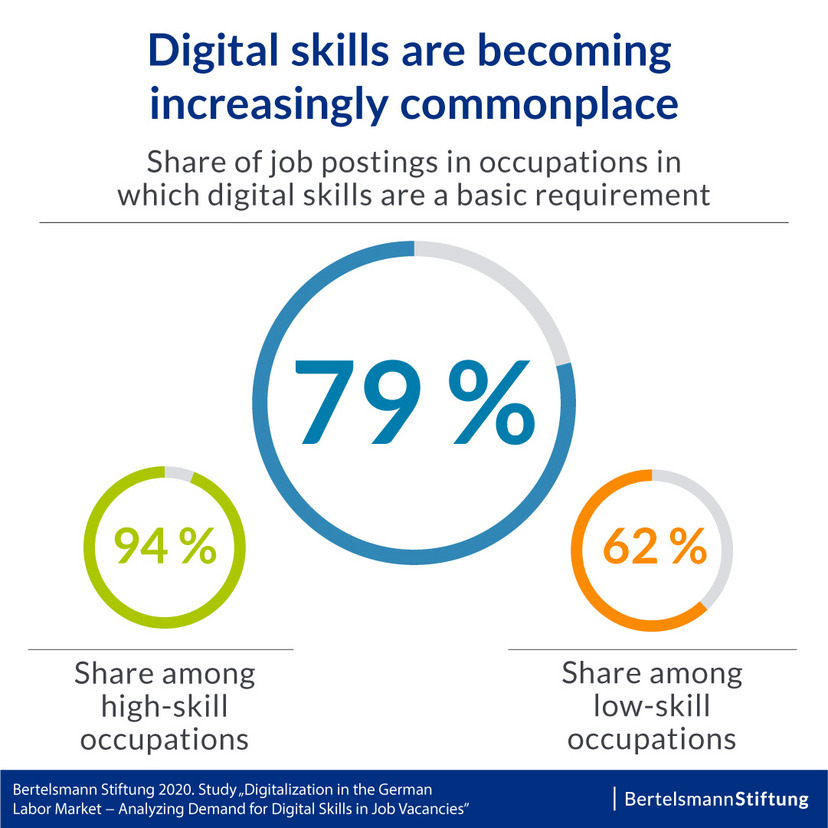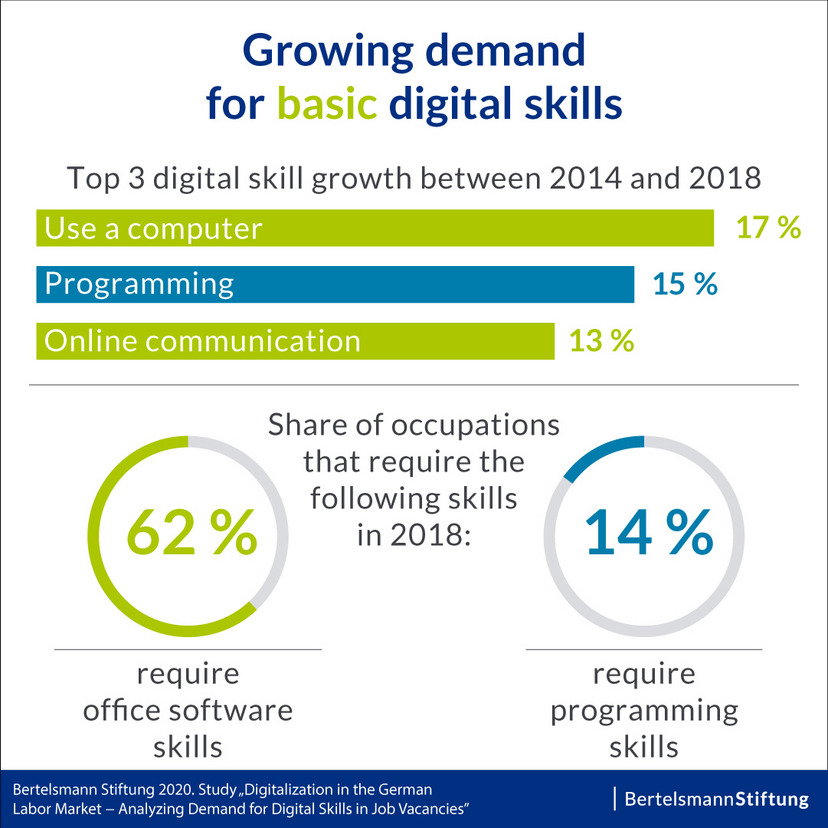Digitalization is becoming commonplace in the world of work. Of all the online job ads analyzed for the study, the share that required at least one digital skill rose from 38.1% in 2014 to 47.5% in 2018. In terms of the digital intensity of different types of jobs, the findings show that, in 2018, almost 80% of online job ads were for occupations for which digital skills and knowledge are a basic requirement. When qualification levels are examined, however, several key differences become apparent: Among high-skill jobs, 94% of the postings are for occupations that require digital skills, a figure that drops to only 62% for low-skill jobs, such as assistants in the logistics or catering industries.
![[Translate to English:] Junger Mechaniker bei der Arbeit mit einem Laptop](/fileadmin/files/_processed_/f/a/csm_1788566288AdobeStock_141945947_KONZERN_ST-AND_797838a727.jpg)
© AboutLife - stock.adobe.com
Digitalization permeates the entire working world
The demand for digital skills has increased markedly in recent years, even in industries and occupations in which digitalization previously played only a limited role. That is one of the findings from an innovative data analysis that evaluated 26 million online job postings from Germany for the years 2014 and 2018. The study was conducted by us in cooperation with Burning Glass Technologies.
Differences are also apparent across economic sectors. In addition to the information and communications industry, digitalization has become prevalent in the financial services and insurance industry, and among people providing professional, academic and technical services. Conversely, the hospitality and healthcare industries require relatively few digital skills, as do jobs in the social services sector. Those are the findings from our study carried out by the US-based data analytics firm Burning Glass Technologies.
Digitalization is progressing especially rapidly in occupations that were previously mostly analogue
The demand for digital skills is exhibiting particularly strong growth in occupations in which digitalization once played a relatively minor role, such as among service and sales workers.
What employers want most are baseline digital skills. For example, demand for workers who could use a computer rose by 17% between 2014 and 2018. Today, employees are expected to be able to use basic office software suites in 264 of the 425 (62%) occupations (as defined by EU-ESCO categories) examined in the study. Advanced digital skills are expected for far fewer jobs. For example, programming knowledge is required for only 59 of the ESCO occupations and the ability to administer computer systems for only 24.
For Jörg Dräger, member of our Executive Board, the analysis demonstrates a fundamental change in the world of work, one that began even before the corona crisis: "Working digitally is the new normal. Using computers has become commonplace throughout the working world. All areas of education and training must now adapt to reflect the growing demands resulting from digitalization. It is especially important to reach those occupations in which digital skills have played a minor role up to now."
Greater demand for digital skills in male-dominated occupations
Although most jobs now require a greater level of digital competency, a strong correlation also exists in the 2018 data between socio-economic factors and the demand for digital skills. Jobs for which an academic background is expected and which offer higher pay are much more likely to require digital skills. According to Dräger, policy makers and social partners should work to ensure that digital upskilling occurs systematically across all qualification levels. "By acquiring digital skills, even less qualified workers should be able to improve their chances of getting a well-paid and secure job," Dräger says.
The analysis also shows that the demand for digital skills varies by gender. Digital skills, for example, are more often required in male-dominated occupations. These jobs frequently pay more as well. The situation is different in the United States, however, where certain sectors employing a high percentage of women – health care, for example – are already much more digitalized than in Germany. "Digitalization can be a driver of social inequality," Dräger says. "We must act on the policy level to prevent that from happening by offering targeted opportunities for further education."
Additional information
The study Digitalization in the German Labor Market – Analyzing Demand for Digital Skills in Job Vacancies is based on an evaluation of 26 million online job postings on public and private job portals in Germany. The US-based analytics firm Burning Glass Technologies extracted the contents of the ads using state-of-the-art technologies, such as natural language processing, big data analysis and machine learning. It then evaluated the contents based on existing taxonomies such as the European Standard Classification of Occupations (ESCO) and Germany’s Klassifikation der Berufe (KldB). The ESCO definition of digital competencies was used, supplemented by information from the software development platform Stackoverflow.com. An index was thus created that depicts the level of digitalization in different occupations. Still an emerging method in Germany, this approach makes it possible to achieve a more accurate and timely analysis of the digital skills expected by employers than is possible with traditional data sources. Evaluations were carried out for industries and regions in addition to occupations. Additional data sources were used to examine educational levels, pay grades and gender differences. More detailed information on the methodology can be found in the study itself.





